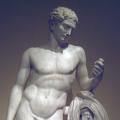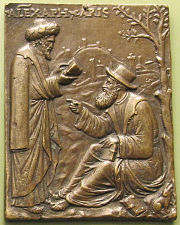83 - Not Written in Stone: Alexander of Aphrodisias
Alexander of Aphrodisias writes the greatest ancient commentaries on Aristotle and tries to demolish the Stoic teaching on fate.
Themes:
Numerous commentaries by Alexander have been translated into English in the Ancient Commentators Project.
• D. Frede, “The Dramatization of Determinism: Alexander of Aphrodisias’ De Fato,” Phronesis 27 (1982), 276-98.
• M. Rashed, Essentialisme: Alexandre d'Aphrodise entre logique, physique et cosmologie (Berlin: 2007). [See also discussion of this book by I. Kupreeva in Oxford Studies in Ancient Philosophy 38 (2010).]
• R.W. Sharples (trans.), Alexander of Aphrodisias: On Fate (London: 1983).
• R.W. Sharples, “Alexander of Aphrodisias: Scholasticism and Innovation,” Aufstieg und Niedergang der Römischen Welt (Berlin: 1987), 1176-1243.
• R.W. Sharples, “Implications of the New Alexander of Aphrodisias Inscription,” Bulletin of the Institute of Classical Studies 48 (2005), 47-56.
• M. Tweedale, “Alexander of Aphrodisias' views on universals,” Phronesis 29 (1984), 279-303.
Stanford Encyclopedia: Alexander of Aphrodisias







Comments
Offline
Don't go offline just like that! I had planned a sunday evening of philosophical podcasts and thanks to you I actually had to read philosophy. READ! I hope this new episode is up to the usual standard, the best that is!
In reply to Offline by Yannick Kilberger
Back online
That actually sounds like a rationale for going offline occasionally, to send people to the books! But seriously, I hope you enjoyed the new one.
In reply to Back online by Peter Adamson
I did. Can't wait for
I did. Can't wait for astrology, now there is one painful subject...
Add new comment